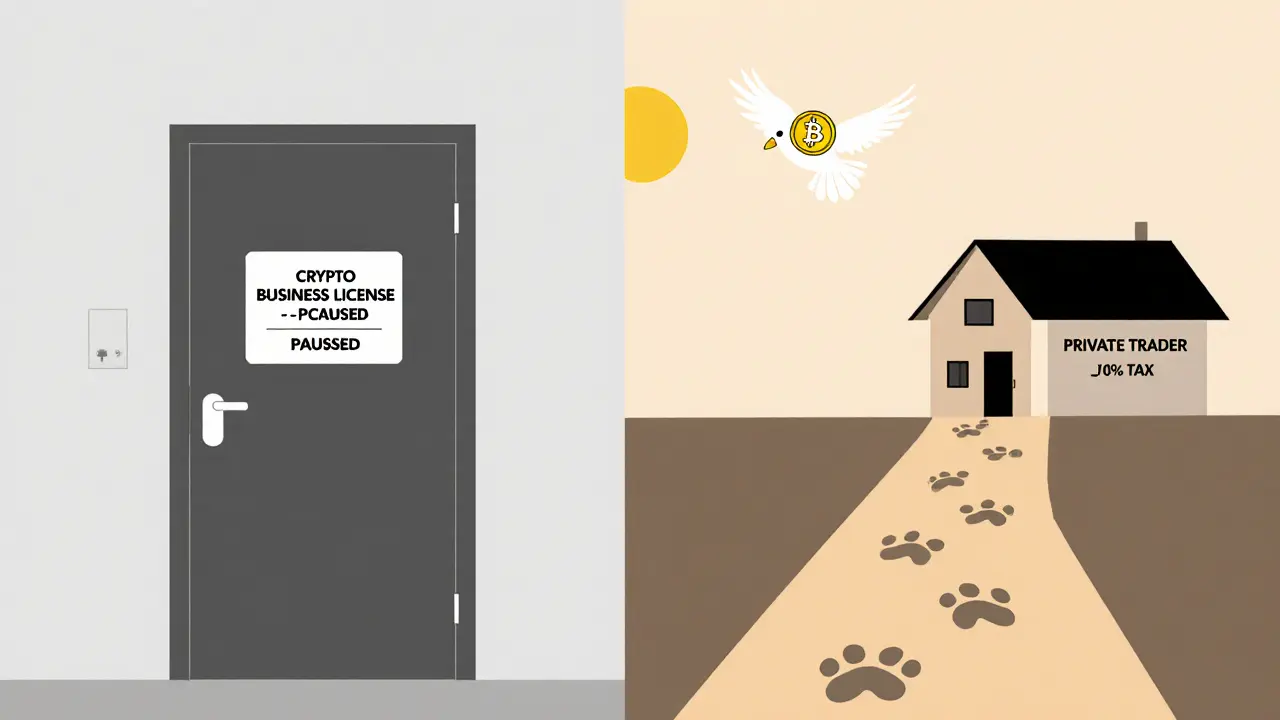Portugal as a Crypto-Friendly Destination for Traders in 2025
 Oct, 29 2025
Oct, 29 2025
Portugal Crypto Tax Calculator
Portugal offers 0% capital gains tax for crypto held over 365 days. Short-term gains (under 365 days) are taxed at 28%. This tool helps you calculate your tax liability based on your specific transactions.
Tax Results
Why Portugal Is Still a Top Choice for Crypto Traders in 2025
Portugal isn’t just a sunny spot for beach lovers-it’s one of the few places in Europe where you can hold crypto for over a year and pay zero in capital gains tax. That’s not a rumor. It’s the law. And even as regulatory chaos swirls around the country, traders from Germany, France, and the UK keep moving here-not for the weather, but for the taxes.
Here’s the deal: if you buy Bitcoin, Ethereum, or any other crypto and hold it for 365 days or more, you don’t owe a single euro in taxes when you sell. That’s it. No reporting. No paperwork. No hidden fees. The Portuguese tax authority, Autoridade Tributaria e Aduaneira (AT), treats long-term crypto gains as tax-exempt capital. This rule hasn’t changed since 2023, and despite all the noise, it’s still in full effect.
The Tax Advantage: How It Actually Works
Not all crypto income is treated the same. If you’re trading frequently-buying and selling within a year-you’ll pay 28% on your profits. That’s higher than some countries, but still lower than Germany’s 45% or France’s 30%. For most traders, the strategy is simple: buy, hold, wait a year, then sell. No tax. No stress.
What about mining or staking? If you earn crypto through mining, staking, or airdrops, those are treated as income and taxed at your personal income rate-up to 48%. But if you hold those earnings for over a year before selling, you still get the 0% capital gains break. That’s a powerful combo: earn crypto, let it sit, and cash out tax-free.
The Non-Habitual Resident (NHR) program used to be the golden ticket for digital nomads. It gave a flat 20% tax rate on foreign income and exempted most overseas earnings. But NHR closed to new applicants in 2024. That doesn’t mean you’re out of luck. If you already have NHR status, you keep it for 10 years. And even without NHR, the long-term crypto tax exemption still stands. That’s why new arrivals are still coming.
Regulatory Chaos: What’s Really Happening
Here’s the twist: Portugal’s crypto rules are in limbo. In January 2025, the Bank of Portugal stopped approving new crypto businesses. Why? Because the country hasn’t passed the laws needed to implement the EU’s Markets in Crypto-Assets (MiCA) regulation, which took effect in December 2024. So while MiCA is now EU law, Portugal hasn’t translated it into its own legal system.
This created a legal gap. Existing crypto firms can keep operating under old AML rules. But new ones? They’re stuck. No new licenses. No new registrations. The Bank of Portugal says it can’t supervise what it can’t legally authorize. That’s not a shutdown-it’s a freeze.
Some traders got burned by this. Startups that moved to Lisbon in late 2024 to launch a crypto exchange are still waiting. One founder told Bloomberg they spent €80,000 on legal setup, only to hit a wall in January. Meanwhile, individual traders? They’re fine. The tax rules don’t care if your exchange is licensed. As long as you’re not running a business, you’re not affected.

Who’s Still Moving to Portugal?
Despite the regulatory mess, crypto traders are still relocating. Statista reports 850,000 Portuguese citizens own crypto-8.2% of the population. Of those, 23% are foreign residents. That’s not coincidence. It’s strategy.
Reddit threads from Lisbon and Porto in early 2025 show traders comparing Portugal to Switzerland. “Swiss banks won’t touch crypto,” one user wrote. “In Portugal, I can open a bank account, pay my rent in BTC, and pay zero tax on my gains after a year.”
Trustpilot reviews from crypto users in Lisbon give Portugal a 4.2/5 rating. The top comment: “Tax benefits are insane. The bureaucracy? A headache. But worth it.”
People aren’t coming for the startup scene. They’re coming for the tax code. And they’re bringing their wallets with them.
What You Need to Do Before You Move
If you’re thinking of relocating, here’s what matters:
- Hold your crypto for 365 days before selling to qualify for the 0% tax rate. Track your purchase dates. Use a crypto tax tool like Koinly or CoinLedger to stay organized.
- Don’t run a crypto business unless you’re ready to wait. If you want to launch an exchange, wallet service, or trading platform, hold off until MiCA is implemented-expected by mid-2026.
- Open a Portuguese bank account. Most banks won’t turn you away if you’re a private trader. You’ll need your passport, proof of address, and a declaration that you’re not operating a business. Some banks, like Millennium BCP, have crypto-friendly branches in Lisbon.
- Get legal advice. If you’re unsure whether your activity counts as “trading” or “investment,” talk to a firm like Morais Leitão. They handled 73 MiCA compliance cases in Q1 2025. It’s worth the cost.
- Keep records. Even if you’re not taxed, the tax authority can ask for proof of purchase dates and transaction history. Save your wallet addresses, exchange statements, and blockchain explorer links.

How Portugal Compares to Other Crypto Havens
| Country | Long-Term Crypto Tax | Short-Term Crypto Tax | Business Licensing | Regulatory Clarity |
|---|---|---|---|---|
| Portugal | 0% | 28% | Paused (MiCA pending) | Low (regulatory gap) |
| Switzerland | 0% (in Zug) | Up to 40% | Clear, licensed | High |
| Germany | 0% after 1 year | Up to 45% | Clear, licensed | High |
| Malta | 0% after 1 year | 35% | Clear, licensed | High |
| France | 30% | 30% | Clear, licensed | High |
Portugal’s edge? The 0% long-term tax. No other EU country offers that without strings. Switzerland has it, but the cost of living is 3x higher. Germany has it, but bureaucracy is thick. Portugal gives you the tax break with lower living costs-and a lifestyle most people can’t match.
What’s Next? The Road to MiCA
Portugal’s government says it will pass MiCA implementation laws by July 1, 2026. That’s the EU deadline. Until then, the country operates in a gray zone. But here’s the thing: the tax rules won’t change. They’re written into national law, not EU law. Even if MiCA comes through, the 0% long-term capital gains exemption is unlikely to be touched.
Industry experts from Blockchain Portugal Association predict that once MiCA is in place, Portugal could become Europe’s third-largest crypto hub-after Switzerland and Germany. They estimate crypto-related economic activity could hit €1.2 billion annually by 2027.
Right now, it’s a waiting game. But for individual traders? The game is already won.
Final Thought: Is Portugal Right for You?
Portugal isn’t the easiest place to start a crypto company. But if you’re an individual trader, investor, or digital nomad who wants to hold crypto long-term and keep your gains? It’s one of the best places on Earth.
You don’t need to be rich. You don’t need to be a tech expert. You just need to understand one rule: hold for a year. Everything else-banking, residency, even the regulatory mess-is just noise.
The sun is nice. The coffee is cheap. But the real reason people are moving? The tax code doesn’t take a cut.
Is crypto really tax-free in Portugal?
Yes, but only for long-term holdings. If you hold crypto for 365 days or more, any profit from selling is completely tax-free. If you trade within a year, you pay 28% on gains. This applies to individuals, not businesses. Mining and staking income are taxed as regular income, but if you hold those assets for over a year before selling, you still get the 0% capital gains rate.
Can I open a bank account in Portugal as a crypto trader?
Yes, but not all banks are easy. Most require proof you’re a private investor, not a business. You’ll need your passport, proof of address (even a rental contract), and a signed declaration stating you’re not operating a crypto exchange or service. Banks like Millennium BCP and Novo Banco have branches in Lisbon that work with crypto holders. Avoid smaller credit unions-they’re more likely to refuse.
Is the NHR program still available for new crypto traders?
No. The Non-Habitual Resident program closed to new applicants in January 2024. If you already have NHR status, you keep it for 10 years. But you don’t need it to benefit from Portugal’s crypto tax rules. The 0% long-term capital gains exemption applies to everyone, regardless of residency status.
Should I start a crypto business in Portugal right now?
Not yet. Since January 2025, the Bank of Portugal has stopped approving new crypto service providers because Portugal hasn’t passed the MiCA implementation laws. New businesses can’t get licensed. Existing ones can keep operating under old rules. If you’re planning to launch an exchange, wallet, or trading platform, wait until MiCA is in place-expected by mid-2026. Otherwise, you risk wasting time and money.
What happens if Portugal changes its crypto tax rules?
It’s possible, but unlikely in the short term. The 0% tax on long-term crypto gains is written into Portugal’s national tax code, not EU law. Even if the EU pressures Portugal to harmonize taxes, changing this rule would require parliamentary approval-and it’s politically popular. Traders, retirees, and digital nomads have made this a key selling point for the country. Any attempt to remove it would face strong public and economic backlash.
Do I need to declare my crypto holdings in Portugal?
You’re not required to declare holdings unless you sell and trigger a taxable event. If you hold for over a year and don’t sell, no declaration is needed. If you sell within a year, you must report the gain on your IRS tax return. Keep records of purchase dates, wallet addresses, and transaction IDs in case the tax authority asks.
How do I prove I held crypto for a year?
Use a crypto tax tool like Koinly, CoinLedger, or ZenLedger. These platforms automatically track your purchase and sale dates across wallets and exchanges. You can export reports for the tax authority. Alternatively, save screenshots of your wallet transaction history with timestamps. Blockchain explorers like Etherscan or Blockchain.com also show exact dates. The key is having verifiable, timestamped records.
Are crypto losses deductible in Portugal?
Yes. If you sell crypto at a loss within a year, you can offset that loss against other short-term gains. Losses can’t be carried forward to future years, but they can reduce your taxable income in the same year. Keep detailed records of all trades, even losing ones. The tax authority doesn’t require you to report losses, but if you’re audited, having them documented helps.